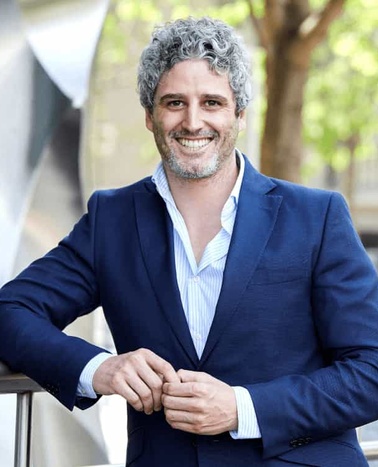
Sergio de la Torre
I have been working in the pharmaceutical sector for more than ten years. Although I have also dedicated myself to research and development, I am now more focused on management and strategic direction within my company.
The Executive MBA has allowed me to prepare myself in these disciplines while acquiring new skills and ideas that I have implemented in my daily life in my organization. It is a challenging experience but very rewarding for both parties.

“I have to say that the transition to marketing without prior training was a great leap into the void, but the Executive MBA has undoubtedly been a giant parachute.”
After ten years in the pharmaceutical sector, what skills do you think are necessary for a manager in the industry?
A manager in the pharmaceutical industry must have a thorough understanding of the process, from preclinical and laboratory to product delivery, all without losing sight of innovative ideas and market trends. The ability to integrate science and business strategy, understand global logistics and the complexities of distribution, and focus on quality and regulation, are fundamental skills. My background in clinical research provided me with a solid foundation, but as I moved into more commercial roles, I saw a need for deeper managerial skills. The Executive MBA has been key to developing that holistic vision and strengthening my essential leadership competencies.
What motivated you to pursue the Executive MBA?
After immersing myself in research and development during my PhD, I felt the need to expand into management and strategic direction. The Executive MBA came up as an opportunity that I could use within my company, and I didn't hesitate to take advantage of it.
Did Eli Lilly back you from the beginning? How did you convince them to support you studying the program?
They say that people understand each other by talking, and in my case, this was no exception. I explained that the Executive MBA would not only prepare me to take on future challenges but would also help me bring a fresh perspective and advanced skill set that would be directly applicable to the company's goals. By aligning my personal development goals with the needs of the company, it became clear that the program would be a win-win for both parties.
It's been more than 15 years since you finished your bachelor's degree in pharmacy. Was it hard to return to the classroom?
The transition back to the classroom has been more of a nice memory than a challenge. In our industry, continuous learning and studying is a necessity. I have to admit that there was a learning curve. And more than that, the reading material was at a very high level in the beginning. But I soon found myself enjoying both the dynamics of the program and the enriching debates, in which I’m learning a lot from the enormous experience of my classmates. In addition, the camaraderie among our team has been fundamental. It’s been an opportunity to recharge my batteries and feel like a university student again.
What was it like combining your professional responsibilities with your Executive MBA schedule?
At first, finding the balance between work, study and travel was like trying to juggle while on a moving bike—but over time I found my rhythm. The key has been in planning and adaptability, both on my side and in regard to the structure of the program. Interestingly, I've found that the skills I'm learning apply not only in the context of the program, but in the day-to-day management of my job responsibilities, which has made all the effort worthwhile.
In a position as customer-oriented as yours, what knowledge from the Executive MBA are you finding most useful?
I have to say that the transition to marketing without prior training was a great leap into the void, but the Executive MBA has undoubtedly been a giant parachute. The classes where we’re learning customer segmentation, market analysis, digital channel strategy and campaign development have been particularly valuable for me. I’ve gained skills to communicate effectively with diverse customer groups and have learned to use information to improve our marketing strategies. This has allowed me to approach my role with a confidence and competence that I didn’t have before.
Which subjects would you highlight?
Incredibly, the subjects I dreaded the most—such as finance and accounting—have ended up being among my favorites. I found a new appreciation for numbers and their role in strategic decision-making. Also, the management simulator was a transformative experience. It allowed me to dive into the reality of business management in a competitive environment, especially as we couldn’t let the rest of the groups beat us. I also have to mention the negotiation course because I now feel more prepared to understand and handle difficult conversations, as well as how and when best to present my arguments.
How do you rate the program's networking opportunities? What have you learned from your peers?
The value of networking at IE University is immeasurable. Beyond the classroom, I’ve found colleagues in this business world, each with their own story and knowledge to share. The opportunity to learn from their experiences and share mine has broadened my perspective in unimaginable ways. We’ve exchanged ideas that have led to collaborations and projects that I’m sure will last beyond graduation.
In addition, this network is a living fabric of professionals; not only do you interact with your colleagues but you are permanently connected to a community of alumni and professors linked to IE University. This big family enjoys everything from informal meetings to group projects.
What has most surprised you about the program?
The most pleasant surprise has been the flexibility of the program to accommodate our professional lives, as this was something I was very concerned about when I started. The way content and assignments are integrated into our daily routine reflects a carefully considered program design. I’ve also been impressed by the immediacy with which we can apply what we’ve learned in our daily roles at work, which makes each module a ready-to-use tool.
Have you noticed a change in your vision of the sector or in the way you work?
My industry vision and my approach to work have undergone a radical change. I've taken a more strategic perspective and changed the way I lead. Plus, I'm much more analytical in my decision-making. Currently, I’m leading a pioneering project in the use of AI in the marketing and medical department in my company, something that I wouldn’t have been able to do without the foundation I was able to build during the Executive MBA. Every step of the way I’ve felt the unconditional support of the teachers—something that has been fundamental.
Would you recommend that other companies invest in having their employees do this program?
I would recommend a company to invest in this program without a moment’s hesitation, especially if the company is looking to nurture and expand its leaders’ capabilities. Investment in this program goes beyond individual education; it’s a collective investment with clear innovative potential for the company. What we learn at IE University really takes us to the next level in practice. Every new idea or project that’s born out of what we've learned here has the potential to improve and expand our company significantly.